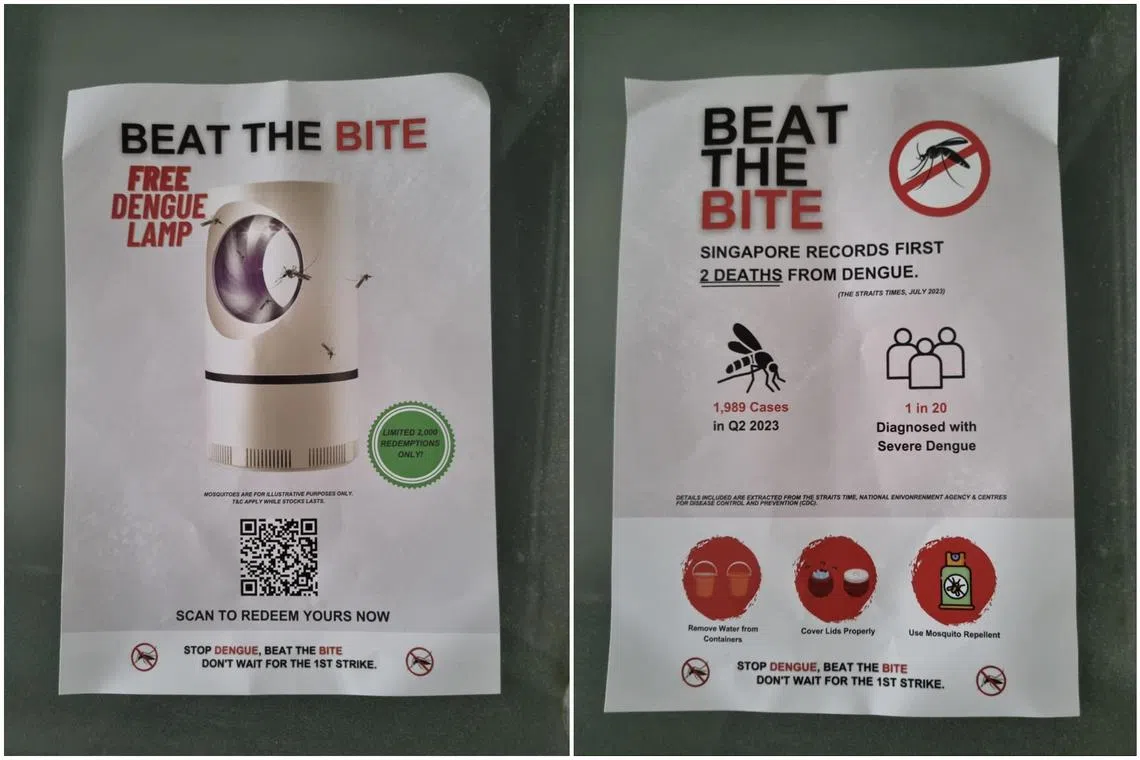MAS urges caution over fliers offering free anti-mosquito lamps for meeting financial adviser
Sign up now: Get ST's newsletters delivered to your inbox

The flyer had obvious spelling errors in the text, and residents who scanned the QR code had to enter personal details in a website.
PHOTOS: YUKNA
Follow topic:
SINGAPORE – The Monetary Authority of Singapore (MAS) has urged the public not to respond to suspicious advertisements after some Ang Mo Kio residents received an anonymous flier offering free anti-mosquito lamps if they meet a financial adviser.
The fliers, which residents of a Housing Board block in Ang Mo Kio Street 21 found slotted through their gates in September, had the words “Beat The Bite” printed prominently at the top.
It also contained alarming headlines such as “Singapore records first two deaths from dengue” and “One in 20 diagnosed with severe dengue”.
It attributed the figures to organisations such as The Straits Times, the National Environment Agency (NEA), and Centres for Disease Control and Prevention in the US, but there were obvious spelling errors in the text.
The catch, that residents had to meet a financial adviser before redeeming their lamp, was not apparent until they scanned a QR code which led them to a website where they had to enter personal details, including their name, address, phone number and e-mail.
Such lamps are sold on e-commerce platforms for about $20, and are advertised as being able to attract and kill mosquitoes.
Mr Yukna, 23, who found the leaflet on his doorstep on Sept 29, told ST he initially did not think much of it initially as dengue-related public advertising was “not out of the ordinary”.
But his guard went up after he scanned the QR code and saw the prompts for his personal details. In the fine print, he read that applicants will have their contact details shared to “associated third parties”, so a financial services consultant could conduct a 20-minute sharing session with them before they receive the lamp.
The website does not state which company the consultants are from.
“On hindsight, (there were) lots of red flags,” said Mr Yukna, a National University of Singapore undergraduate studying computer science who wanted to be known by only his first name.
Among the things he found suspicious was the fact that there was no company logo or source, and no alternative URL link for the QR code.
The website linked to the QR code states that the personal information was being collected by “The K Marketing Pte Ltd’, but contact details of the company could not be found online.
On Friday, the NEA posted an image of an almost identical flier on Facebook and said it is not from the agency. It added that the public should be cautious when receiving such materials “especially if they are unsolicited or from unknown sources”.
“For updates on dengue and other environmental public health topics, refer to official sources such as NEA’s website or social media channels,” said the agency.
An MAS spokesman advised consumers against responding to anonymous advertisements such as the flier that Mr Yukna received as they could be from unauthorised persons.
The spokesman added that under MAS guidelines, financial advisers are required to clearly disclose their identities and the financial institutions they represent when conducting marketing and prospective activities in public.
Those who receive questionable leaflets should check MAS’ Financial Institutions Directory, Register of Representatives and its Investors Alert List to ensure that the corporations and individuals on the publication are authorised to conduct such financial activities, said the spokesman.


